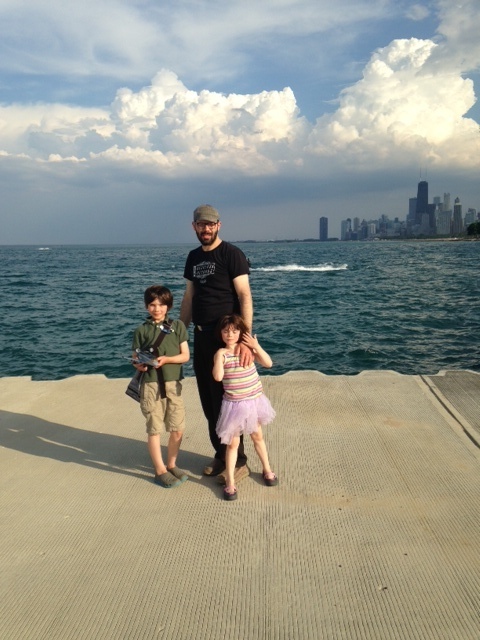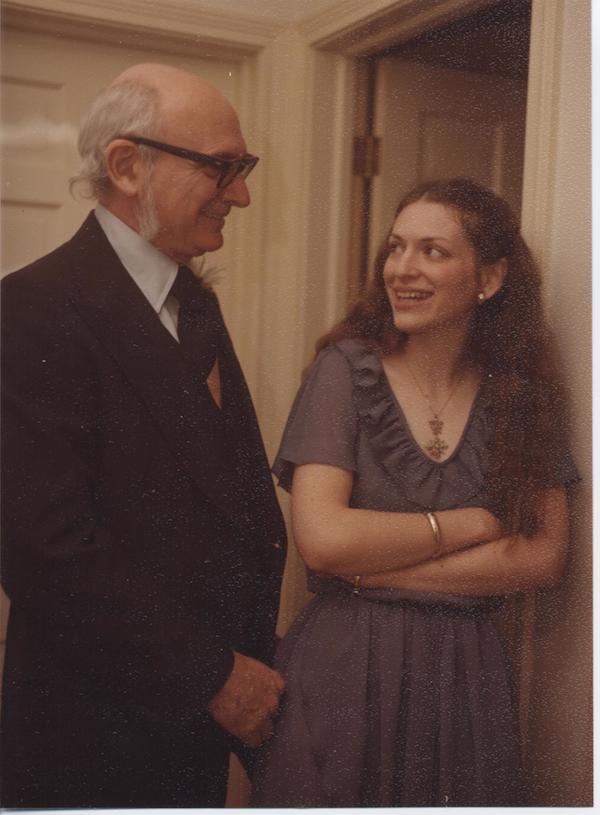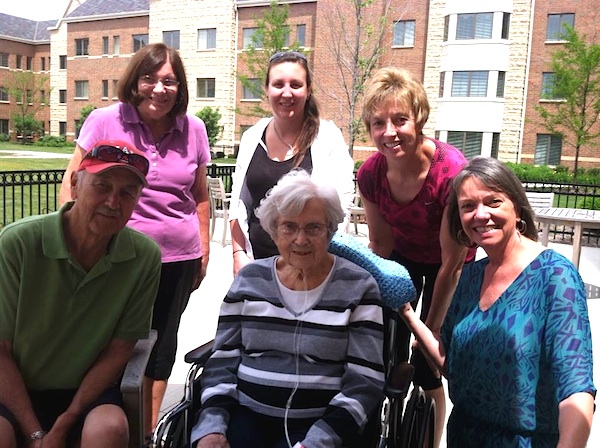The moral of the story: Always share and always listen
June 18, 2014 • 5 Comments • Posted in blindness, guest blog, memoir writing, Uncategorized, writingThink people who are blind can’t benefit from the visual arts? Think again! I have visual artist Vanessa Navarrete (and Kathy Zartman, a writer in my Lincoln Park Village memoir class) to thank for giving me the benefit of connecting with writer Francisco Navarrete. I was flattered when he contacted me for help on a short story he’s working on, and honored that he’d take time away from his fiction writing to put this guest post together to explain how we met.
A work of art is never finished
by Francisco Navarrete

That’s Francisco with his kids. (Photo by Vanessa Navarrete)
I am not blind, but in a short story I’m working on now I’m trying to “see” what that might be like. The main character is a teenager who has been blind since she was born. Janey’s boyfriend can see, and she’s spending her last evening with him before he leaves for college.
My attempt at blindness is combined with an attempt at being female, and at being seventeen — I’m a thirty-seven year old man. In fact, the impetus for writing this story was to escape myself for a little while, to be someone else who senses life differently than I do.
I workshop my work, with my wife or my writing group, and that usually acts as a filter for certain moments in a story. Having a blind character, though, I wanted to share my story with someone with that sort of specific first hand experience.
I was in Janey’s mindset for ten weeks and was generally happy with my story, and then I got to talking with a collector at my wife’s art opening and found out she has a writing teacher who is blind. What a tremendous opportunity to get it “workshopped” by someone with a very unique perspective! Rather than write Beth, though, I did nothing about it. Janey’s story was stuck in its present form, like the ice on the sidewalk this winter. And you just get used to things like that.
Spring came, and the changes that come along with it started affecting my sense of duty to my story, to my character. The more I write, the more I really care about my characters. I don’t shelter them or anything, I send them off into deep dark places that I don’t want to go to; but, I look out for them. Well, Janey needed somebody. She was patiently waiting for me to have someone see her for who she was, so I sent her to Beth, all the time thinking that I probably wouldn’t hear anything back. I mean, how often does one call out into the void for an answer and actually get one?
The very next morning, I had the kindest and most thorough response I’ve ever received waiting in my inbox. Beth’s writing voice was immediate, clear and masterful. She gave me insights into how blindness doesn’t really make you turn to your other senses so intensely. That there is a casual quality to going about your day like anyone else would. That when she gets up, or walks down the street, it’s simple shifts she notices, or things that are of immediate but not necessarily noteworthy importance.
Beth was quick to call out things I might assume a blind person would do, but that she doesn’t ever do herself. For instance, early in the story, I originally wrote:
Tracing his nose, up the bridge, over his brow, she followed the contour of his temples down over his cheekbones and along the sides of his neck to his collar.
In response Beth wrote, “I never ever want to feel the faces of people I meet or know. Lots of sighted people think blind people do this a lot –I have even had some relative strangers ask me if I want to feel their face. Okay if the woman in your story feels her boyfriend’s face, though — he’s her boyfriend! I just might not put such an emphasis on it — she would probably feel his face just the way other lovers feel each other’s face — not feeling for the contours or the shape of his nose, just a loving brush of the back of her hand on his cheek or some other loving touch.” So, I changed Janey’s gestures to be simply romantic:
She followed the contour of his cheeks along the sides of his neck down to his collar.
The change successfully economizes the moment, and puts the emphasis on their relationship – not on pointing out that Janey is blind in a way that might not be true to being blind. Beth told me to try writing descriptively and trust my readers to know what it is I mean. Reading Beth’s letter, then reading through my story, I see that as a writer I am often out there shouting, “Look, I’m writing this,” when I should be entirely invisible. Or at least only whispering.
I’ve printed out Beth’s letter, so now I have it accessible for quick reference while I work on my revisions. I guess the moral of the story is always share and always listen, and, as Flaubert said, “A work of art is never finished. It is merely abandoned.”


